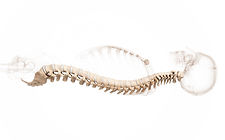
Dr. Natalia Mercuri, DC
AVCA Certified Animal Chiropractor
Northern Illinois
Call/Text: 630.394.4228
drnatalia@barnyardchiropractic.com
chiropractic care for animals

ABOUT
Dr. NATALIA

Dr. Natalia is a lifelong equestrian and animal advocate who believes in the power of the body to heal and adapt to the environment when the body is moving well and the nervous system is functioning optimally.
Dr. Natalia graduated cum laude as a Doctor of Chiropractic from Life University and received advanced training in animal chiropractic from Parker University. She is certified in animal chiropractic by the Animal Chiropractic Certification Commission (ACCC) of the American Veterinary Chiropractic Association (AVCA). She has also published research in the Annals of Vertebral Subluxation Research supporting the efficacy of animal chiropractic.
Follow @barnyardchiro
for practice updates and all things animals!

My approach to chiropractic

Chiropractic is a philosophy, science and art. We understand that every living organism is a self-regulating, self-healing entity controlled by the nervous system. If nerves become irritated, communication throughout the body is disrupted affecting function of cells, tissues, and organs.
Scientific research has shown that chiropractic adjustments support health and vitality by removing interference in the nervous system and allowing for improved neurological control of the body. Interference may be caused by physical, chemical and emotional stressors such as injuries, nutritional imbalances and mental fatigue. If interference is not removed, it often leads to more issues like pain, stiffness, delayed healing, inefficient digestion, sleep disruption, and behavioral changes.


Many different chiropractic techniques have been developed to evaluate and address neurological interference. We primarily us our hands to perform examinations and adjustments. In some cases, x-rays are necessary to further evaluate internal structures or an instrument is used to augment an adjustment.
animal chiropractic
HOW DOES CHIROPRACTIC HELP ANIMALS?
Chiropractic is helping creatures great and small function better and live happier, healthier lives by correcting a condition called vertebral subluxation. It is a condition characterized by lack of motion in a joint, and it interferes with the function of the nervous system. Because the nervous system controls all bodily functions, subluxation can lead to a multitude of issues including dysfunction and disease.
HOW DO I KNOW MY ANIMAL NEEDS CHIROPRACTIC?
Animals can tell us a lot without using words. Signs of subluxation include muscular imbalances, gait irregularities, lameness, and resistance to certain movements. Loss of normal mobility causes stiffness and pain, which may lead to changes in behavior and progressive dysfunciton throughout the body. Many issues resolve with chiropractic care because the body is better able to heal and self-regulate when the nervous system is clear of interference.
HOW OFTEN DO ANIMALS NEED CHIROPRACTIC?
Many people first find chiropractic for their animals after an injury or when traditional veterinary care doesn't solve the whole problem. Initial recommendations for corrective care depend on many factors including type and degree of injury, whether injury is acute or chronic, age of the animal, and goals for care. I expect to see change in an animal within 3 adjustments, and often we see changes sooner.
Humans ask animals to perform tasks and fill rolls that add to the typical stress of living in the world, so we believe it is essential for animals to receive well checks to identify and address issues before they become a bigger problem.
services & Fees
I understand that choosing care for your animal often comes with many questions. I’m happy to offer a complimentary 10–15-minute phone call to help you decide if chiropractic care is right for your animal. For more in-depth conversations, extended phone consultations are available for $40.
I see small animals in St Charles on Monday, Wednesday, and Thursday.
I am mobile seeing animals at home on Tuesday and Friday.
Every Initial Exam includes coordination with your veterinarian, so you can feel confident knowing your animal’s care is fully supported. Click HERE for more information about how coordination of care works in Illinois.
I recommend planning on at least two follow-up visits for small animals and at least one follow-up visit for larger animals like horses because healing takes time and repetition. We also often learn the most from how an animal responds to care.
Small Animal Services
Initial Exam
History,exam, and movement assessment
$95
Acute Injury / Re-Exam
Focused assessment for existing patients
$60
Chiropractic Adjustment – Clinic
$80
Chiropractic Adjustment – Mobile Visit
$110
Large/Equine Services
Initial Exam
History, exam, and movement assessment
$95
Acute Injury / Re-Exam
Focused assessment for existing patients
$60
Chiropractic Adjustment
$165
Travel
1-10 miles $20
11-20 miles $40
21-30 miles $60
31-40 miles $80
41+ miles please ask
Mobile visit/barn call mileage is calculated from Huntley, IL 60142. Travel may be shared by a group ($10 minimum per person).
Call or text 630-394-4228 to discuss chiropractic care for your animal!
© 2017-2026 by Barnyard Chiropractic, LLC


